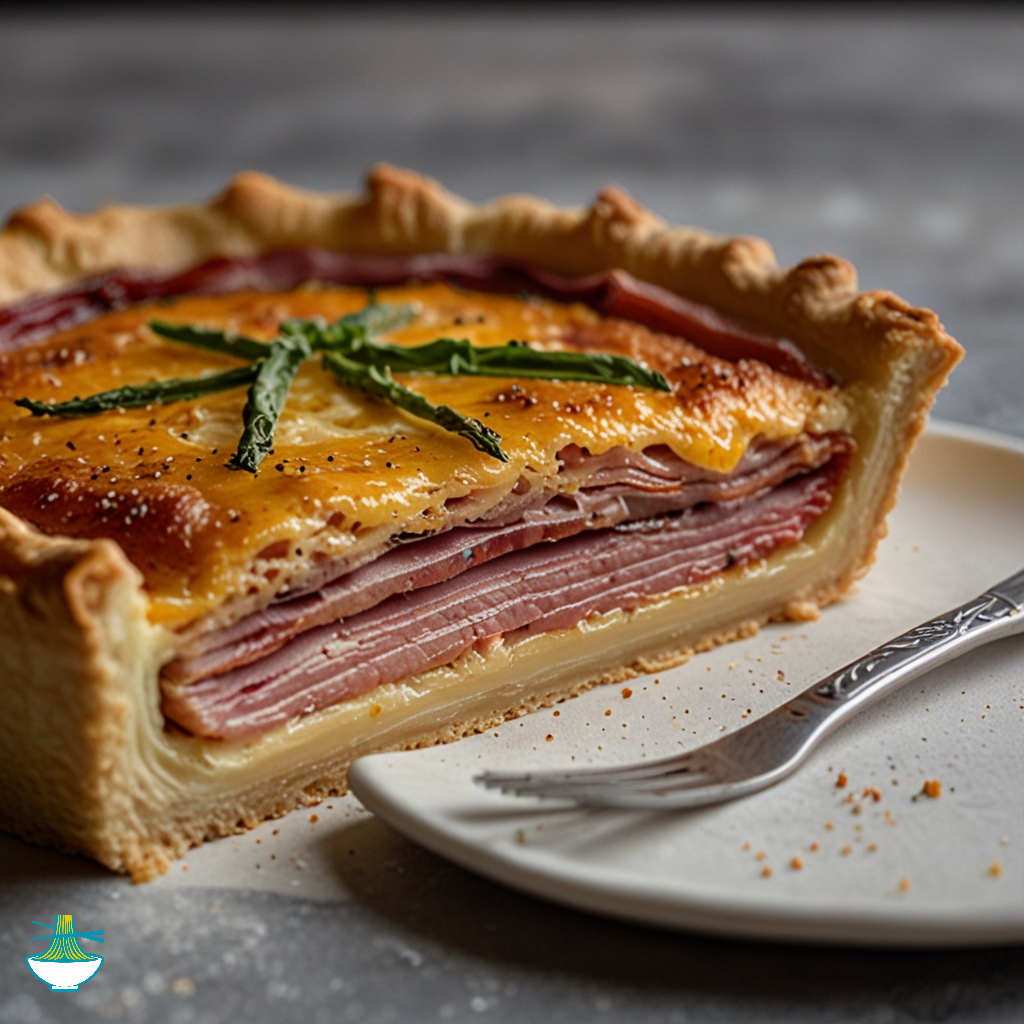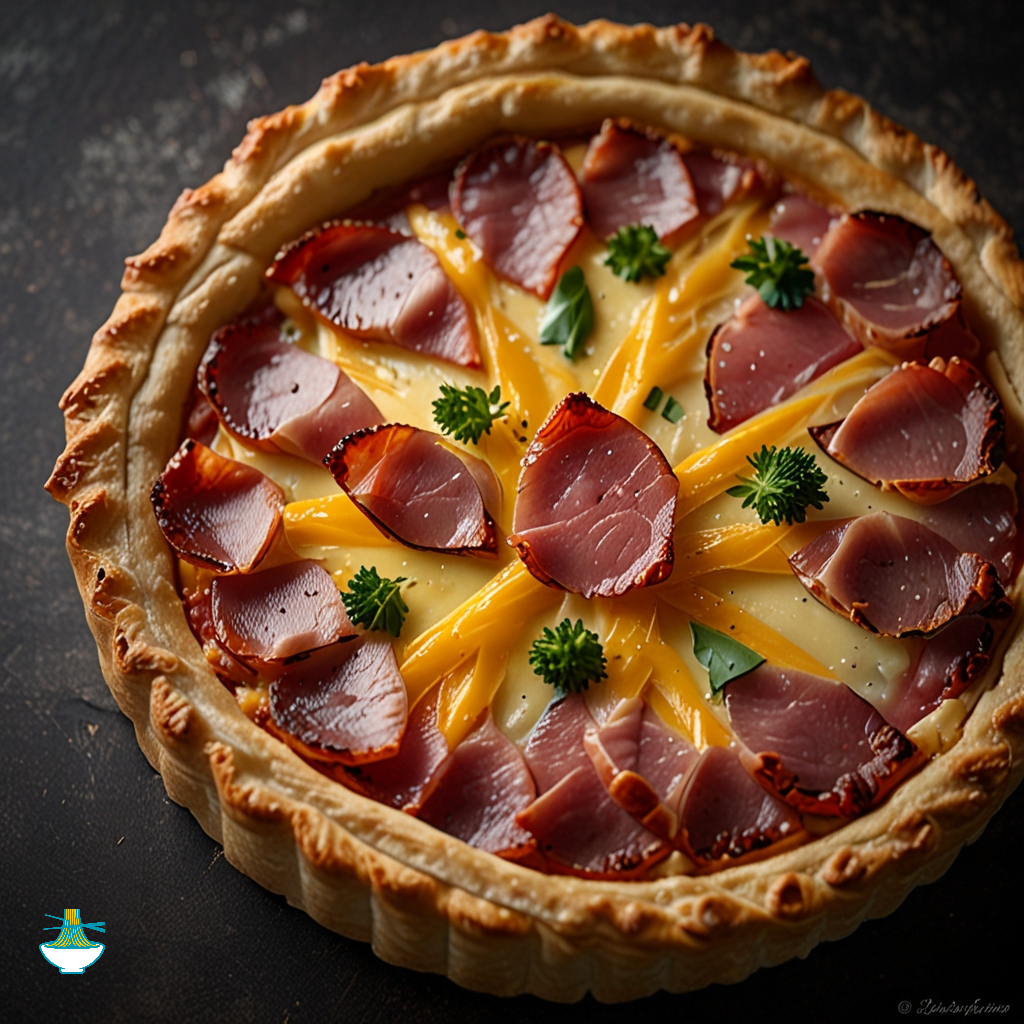Tarta de Jamón y Queso, a delectable Spanish dish, features a savory pastry crust filled with a delightful combination of ham, cheese, and often vegetables. This hearty tart offers a perfect blend of flavors and textures, making it a favorite among both home cooks and food enthusiasts alike.
The origins of Tarta de Jamón y Queso can be traced back to Spain, where it is a popular dish enjoyed in homes and restaurants across the country. This culinary creation showcases the rich tradition of Spanish cuisine, characterized by its emphasis on simple yet flavorful ingredients. Over the years, the recipe has evolved to include various regional variations, each adding its own unique twist to this classic dish. Today, Tarta de Jamón y Queso continues to be cherished as a beloved culinary gem, representing the rich tapestry of flavors found in Spanish cooking.
Ingredients:
- 1 ready-made pastry crust
- 200g ham, diced
- 150g cheese (such as cheddar or mozzarella), shredded
- 1/2 onion, finely chopped
- 1 bell pepper, diced (optional)
- 3 eggs
- 200ml heavy cream or milk
- Salt and pepper to taste
Method:
1. Preheat your oven to 180°C (350°F).
2. Place the ready-made pastry crust in a tart pan or pie dish, pressing it gently to fit the bottom and sides.
3. In a bowl, whisk together the eggs and heavy cream or milk until well combined. Season with salt and pepper.
4. Sprinkle the diced ham, shredded cheese, chopped onion, and diced bell pepper (if using) evenly over the pastry crust.
5. Pour the egg mixture over the ham and cheese filling, ensuring it is evenly distributed.
6. Bake the tart in the preheated oven for 30-35 minutes, or until the filling is set and the pastry is golden brown.
7. Remove the tart from the oven and allow it to cool slightly before slicing and serving. Enjoy your delicious Tarta de Jamón y Queso!
Nutrition Value:
1. Ready-made pastry crust:
- Calories: Approximately 100-150 per serving (varies based on brand and size)
- Carbohydrates: Typically around 10-15g per serving
- Protein: About 1-2g per serving
- Fat: Roughly 6-10g per serving
- Sodium: Varies but can be around 100-200mg per serving
- Nutritional Benefit: Provides energy from carbohydrates and fats, but may contain added sugars and preservatives. Pastry crusts typically lack significant vitamins and minerals.
2. Ham, diced (200g):
- Calories: Around 200-250 calories
- Carbohydrates: Negligible (less than 1g)
- Protein: Approximately 20-25g
- Fat: About 10-15g
- Sodium: Depending on processing, may contain a moderate amount of sodium (200-600mg)
- Cholesterol: About 60-80mg
- Nutritional Benefit: High in protein, provides essential amino acids, vitamins B6 and B12, and minerals like zinc and iron. However, it can be high in sodium and cholesterol, so moderation is key.
3. Cheese, shredded (150g):
- Calories: Approximately 500-600 calories
- Carbohydrates: Around 2-4g
- Protein: About 30-40g
- Fat: Roughly 40-50g
- Sodium: Varies but can be significant (300-600mg)
- Cholesterol: About 100-150mg
- Nutritional Benefit: Good source of calcium, protein, and phosphorus. Provides vitamins A, B12, and D. However, it is high in saturated fats and sodium, so consumption should be moderate.
4. Onion, finely chopped (1/2 onion):
- Calories: Approximately 20-25 calories
- Carbohydrates: Around 5-6g
- Protein: Less than 1g
- Fat: Negligible
- Sodium: Very low
- Nutritional Benefit: Low in calories and fat. Provides fiber, vitamin C, and antioxidants like quercetin, which may have anti-inflammatory properties.
5. Bell pepper, diced (optional):
- Calories: Approximately 15-20 calories
- Carbohydrates: Around 3-4g
- Protein: Less than 1g
- Fat: Negligible
- Sodium: Very low
- Nutritional Benefit: Rich in vitamin C, vitamin A, and antioxidants like beta-carotene. Provides fiber and may have anti-inflammatory properties.
6. Eggs (3 eggs):
- Calories: Around 210-250 calories
- Carbohydrates: Less than 2g
- Protein: Approximately 18-20g
- Fat: About 15-20g
- Sodium: Around 200-300mg
- Cholesterol: About 600-700mg
- Nutritional Benefit: Excellent source of high-quality protein. Provides essential amino acids, vitamins D and B12, and minerals like selenium and choline. Eggs also contain lutein and zeaxanthin, beneficial for eye health.
7. Heavy cream or milk (200ml):
- Calories: Approximately 300-400 calories (depending on fat content)
- Carbohydrates: Around 10-15g
- Protein: About 5-8g
- Fat: Roughly 25-30g
- Sodium: Varies but can be around 50-100mg
- Cholesterol: About 80-100mg
- Nutritional Benefit: Provides calcium, vitamin D, and vitamin A. Adds richness and creaminess to dishes but is high in saturated fats and calories, so moderation is advised.
8. Salt and pepper to taste:
- Calories: Negligible
- Carbohydrates: Negligible
- Protein: Negligible
- Fat: Negligible
- Sodium: Varies depending on usage
- Nutritional Benefit: Adds flavor to dishes but should be used in moderation due to its sodium content.


Comments